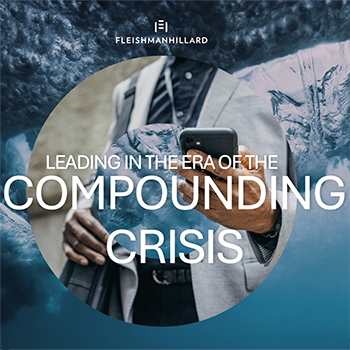TechMunch: Fake News – The fashionable name for an old phenomenon
We all follow the news in some shape or form, don’t we? But how are we expected to know whether the news we are absorbing is factual and valid?
Fake News, the Australian word of the year, has become one of the key buzzwords of the last 12 months, due in part to Donald Trump’s continual use of the phrase. It was during his first news conference as President-elect that the phrase entered the mainstream, as he infamously branded the likes of CNN, New York Times and the BBC, ‘Fake News’.
The phrase has been discussed so often that even Jimmy Wales, the founder of Wikipedia, is starting a new kind of news platform – Wiki Tribune. One that brings journalists and volunteers together to ensure what is reported is factually correct and globally verified.
So why are individuals as influential as Jimmy Wales so concerned about Fake News? And, why has it just become a mainstream phrase? FleishmanHillard Fishburn went to find out.
‘Fake news: the facts’ was an event held in Westminster, the very heart of where UK news is made. The event hosted leading commentators on all things news to discuss whether Fake news is really as new as we all seem to think.
The who’s who of media commentators were in attendance, with the panel being made up of;
- Jimmy Wales, Founder of Wikipedia,
- Sarah Sands, Editor of BBC Radio 4 and former editor of the Evening Standard,
- Craig Silberman, Media editor of BuzzFeed News
- Armando Iannucci, Bafta and Emmy winning writer of political comedy series The Thick of It and Veep
- Tim Wu, Advisor to President Obama and Professor at Columbia Law School
- James Delingpole, columnist at The Spectator, Daily Mail, Daily Express and The Times
Held over two, somewhat prickly hours, not only because the 1000 strong audience were sitting on what were once church pews, the panelists discussed everything from what is truth, whether fake news is a new phenomenon and how is society going to address this apparent rise in fake news and do we need to?
I’ll focus on two key discussions points – if you want to listen to the whole session, find the podcast here.
Facts are different from Truth.
For years students around the world were told that for something to be true it needs to be factual. “Society likes to believe truth is absolute” states Armando Ianucci, “However, any scientist will tell you, when a theory becomes accepted, it is accepted because it’s the most fool proof theory which explains a phenomenon, and can be superseded as soon as another scientist provides a clearer understanding of an occurrence… It would seem truth, rather like the atom, is slightly indefinable.”
Although I don’t completely agree this statement justifies the creation of fake news, it does raise questions over whether all news once it is proven to be false should be deemed fake news. When there is breaking new story theories are thrown around and analysts speculate on why something has occurred. Would this mean they are promoting fake news? Should we wait until we have all the facts before reporting an event? For instance, during the recent Manchester Bombings, news reporters were up all night speculating over what had happened, it wasn’t till the early morning when statements, videos, photos and evidence had all been released could journalists state it was a terrorist attack. Should they have waited till they had all the facts? I don’t believe so. The truth of their reporting wasn’t diminished due to the lack of facts, they believe what they were reporting was true; it wasn’t until more evidence appeared were they proven wrong.
Fake News/Propaganda/Lies – Is there a difference?
We’ve all be in a social situation where we’ve elaborated on a story to make ourselves the ‘hero’…if you haven’t then you’re a better person than me. It’s human nature to elaborate, emphasise and make ourselves seem better than we are. In fact, news outlets do the same. Tim Wu pointed the audience towards the New York Sun in the 1830s. One of New York’s leading newspapers, the Sun published an elaborate six part series discussing the exotic animals living on the moon, purportedly discovered through a gigantic telescope. Without today’s scientific tools and due to the New York Sun’s reputation, this series was believed for a time. Although eventually the story was refuted, it was never retracted by the paper as it was a money spinner for the advertising-based publication. With today’s technology and with man being put on the moon it can be proven this article was a lie.
It appears fake news isn’t new!
However, is there a difference between a lie, like the above article, and propaganda? During times of war or political instability, propaganda has been used with great effect by political parties. Just think of the propaganda of communist countries such as North Korea. Even looking closer to home, the UK political parties use propaganda to try and sway voters. Is this just appealing to individuals in a more emotive manner? Or is it lies? And how do we counter it and do we want to?
Tim Wu argues that in the modern day, the likes of Facebook and social media sites don’t want to prevent propaganda and lies. Nowadays successful journalism is built on gathering impressions, ensuring positive click rates and articles being shared on social media. In order to be successful, journalists are always trying to think of a catchy name to draw you in. Fake news is the culmination of this desire for financial gain.
If a journalist is paid by initial clicks, regardless of bounce rates, they’ll make the most appealing headline they can, capitalize it and make it relevant to the day’s proceedings. It doesn’t matter if it’s true or false the journalist is getting paid.
I believe Fake news at its worse is simply a lie in order to make financial gains. A story which is breaking, and is believed to be true initially is not fake news. It would seem the main difference is the financial motive behind the scenarios.
Overall, Fake News: The Facts was an excellent discussion on the rise of manipulated news and whether we should be actively seeking out a solution, or whether we should just see it as what it is – entertaining information with little truth involved.
Julian Sole, Graduate Trainee, Technology
Find Out More
-
Leading in the era of the compounding crisis
October 2, 2025
-
AI in the Newsroom
August 26, 2025


